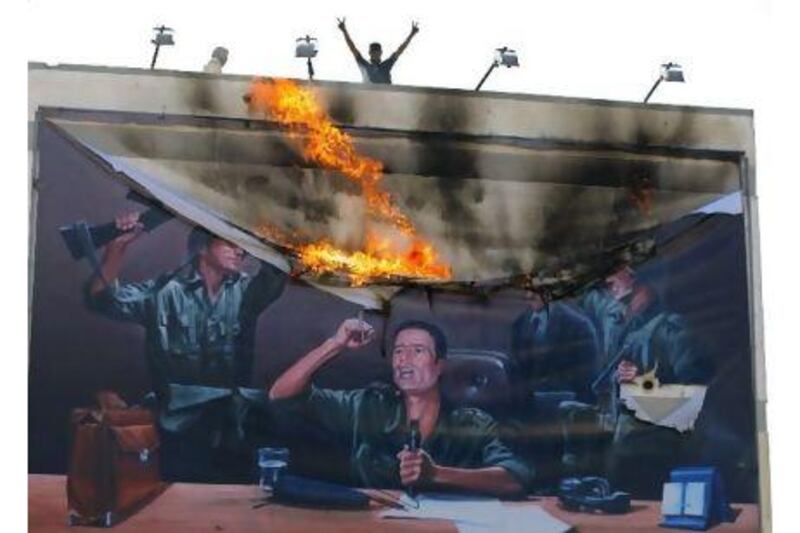TRIPOLI // Libya's interim leaders appealed for humanitarian aid yesterday as they fought for control of a major supply road to the capital, seized a border crossing with Tunisia and strengthened their hold on the country.
Mustafa Abdel Jalil, the National Transitional Council chief, speaking in Benghazi where the rebellion began in February, called for emergency humanitarian aid for the capital, particularly medical supplies.
"We are calling all the humanitarian organisations and telling them that Tripoli needs medicines, first aid products and surgical material," he said.
He blamed "sabotage by Qaddafi's forces" for shortages of water and electricity in Tripoli, and said: "We are working on resolving these problems."
Rebels were working to restart a refinery at nearby Zawiyah that provides fuel for Tripoli's main power plant, said Mahmoud Shammam, the NTC information minister. For now, 30,000 tonnes of fuel would be distributed over the next two days, he said. He also promised a fair trial for the fugutive deposed leader Col Muammar Qaddafi and his senior aides, and to protect them from personal vendettas.
Controlling the road from the Tunisian border to Tripoli would ease growing shortages of fuel and food, particularly in the capital, transformed from metropolis to ghost town over the past week.
Mr Shammam said the interim government's forces already control most of the road, but regime fighters are shelling it in the area of the city of Zwara, midway between Tripoli and the Tunisian border. NTC forces captured the border crossing known as Ras Ajdir, the gateway to the road to Tripoli.
In Sirte, Col Qaddafi's home town, NTC forces were trying to negotiate the surrender of loyalist fighters.
Another challenge facing interim leaders as they seek to replace Col Qaddafi's crumbling regime is a concept, if not a phrase, perhaps as old as war itself: winning hearts and minds.
After six months of stop-and-go war, NTC forces now hold sway in most of the country and last week took control of Tripoli, driving Col Qaddafi into hiding.
But while many have welcomed Col Qaddafi's departure, the NTC is also meeting with scepticism both at home and abroad.
The African Union has said it would refuse to recognise an interim NTC government while fighting continued, and called for an "inclusive" government that in theory would include Qaddafi supporters.
Shops in Tripoli were mostly closed yesterday and the streets nearly empty of cars, apart from the gun-mounted pickups of rebel forces cruising down avenues brilliant with revolutionary graffiti.
"Free Libya" is a common motif, as are caricatures of Col Qaddafi labelled "Bou Chafchoufa", or "Old Frizzle-Head" after his trademark squiggly hair.
Checkpoints have sprung up around the city, often staffed by armed young men and teenagers. For many, they are a poor substitute for security and sometimes cause of friction.
"The other day I was stopped at one of them, and as soon as they saw my police papers they accused me of loyalty to Qaddafi," said Fouad, a taxi driver and former policeman from the Tripoli suburb of Janzour.
Fouad and his family welcome the collapse of Col Qaddafi's regime. They are less sure about the rebels who would replace it.
"I haven't seen anything from them yet to inspire confidence," said Souad, Fouad's cousin, a health ministry worker from the Tripoli neighbourhood of Draybi. "I've seen them go to the street with weapons. I've seen people killed."
The family were relaxing yesterday at Fouad's house in Janzour, a seaside town west of Tripoli, where the hardships of the capital are less acute. Shops were open, and there were enough cars in the street to cause traffic jam.
"In Draybi last weekend, it was burning cars and flying bullets," said Souad. "I want security again. Things have changed so much in the past week."
While other parts of Libya slipped months ago from Col Qaddafi's grasp, Tripoli and the west remained until last week under his control.
For Libyans such as Fouad and his family, Col Qaddafi remains a contradictory figure - part Bou Chafchoufa, part tyrant, part inspiration.
"Did you see his speech to the UN?" said Fouad. "No other head of state would dare say the things he said."
In September 2009, Col Qaddafi gave his first address to the United Nations General Assembly, accusing the UN of weakness and contradictory policies. While the speech was mocked abroad, some Libyans applauded.
"Of course I'm for change in Libya," Souad said. "But I liked Qaddafi as a personality, as a symbol or courage, whatever his policies."
"The most fearsome thing in Libya was Muammar Qaddafi. People feared him, or they respected him and feared him," Fouad said. "Now he's part of our past. The question is whether we'll have a good future."





